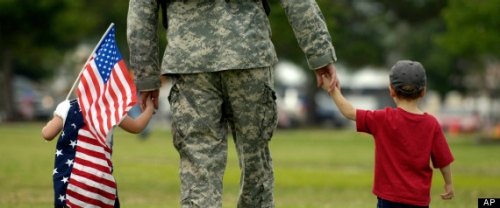What you can do to support military, veterans and families during the holidays

For thousands of families gathering across the country to celebrate the holidays in warm rooms filled with freshly baked cookies and Christmas trees boasting many a shimmering strand of lights, there is always someone noticeably missing.
Abroad in a place they often cannot specify to even their closest loved ones, that someone is an active duty military member – whose presence is missed every day by spouses and children and whose absence can be especially painful during the holiday season. Close to 174,000 of the country’s 1.4 million active-duty military personnel are serving outside the United States, according to a Nov. 27 report from the U.S. Department of Defense, leaving many soldiers and their spouses, children and other family members to feel alone and isolated this holiday season.
It is not only active-duty soldiers and their families who can struggle during the holidays, but veterans, who are finding it difficult to reintegrate into society after being in combat, and their loved ones also often need a friendly shoulder to lean on as they face such issues as posttraumatic stress disorder and financial strains that can lead to homelessness.
College of Nursing Professor Linda Carman Copel, PhD, RN, PMHCNS, BC, CNE, NCC, FAPA, a licensed psychotherapist who works with military families and is a PTSD expert, stressed there is a tremendous need for support for soldiers, veterans and their families during this time of the year. One does not need to look far to help out, and she suggested a number of easy ways to reach someone who could use a little extra love these days.
One can become a member of Soldiers’ Angels, a nonprofit organization that has sent hundreds of thousands of care packages and letters to deployed service members. The group also provides care and comfort to military personnel in Veterans’ Affairs facilities, among a long list of other services. If one does partner with the organization, Dr. Copel suggested baking homemade cookies, knitting or crocheting blankets for wounded veterans or sewing sand scarves – a special type of scarf that keeps sand from flying into soldiers’ eyes, noses and mouths while serving in the Middle East.
Additionally, as a member of Soldiers’ Angels, individuals can “adopt” a family for Christmas and send a grocery gift card for a holiday dinner or gifts. More information is provided at http://www.soldiersangels.com.
There are many organizations that seek volunteers year-round, not just during the holidays – though the season of giving is an excellent time to be inspired to start helping. Licensed mental health professionals can volunteer with such organizations as Give an Hour and The Soldiers Project, for which people can provide free counseling to military service members and their families or other loved ones.
Should a volunteer want something more local, Project H.O.M.E. – which stands for Housing Opportunities for Employment Medical Care Education – is a Philadelphia-based agency that works with volunteers to help veterans and their families who are homeless, or in danger of becoming homeless. More information can be found at http://www.projecthome.org/services/veteran/.
Freedom Dogs and Service Dogs for Soldiers is a group founded by a nurse in California who recognized the value of training psychiatric service dogs to work with veterans suffering from posttraumatic stress disorder. For additional information, visit http://freedomdogs.org.
Dr. Copel noted that there is a “huge need” for training psychiatric and other types of service dogs for soldiers with disabilities. One such agency that those around Villanova can reach out to is Canine Partners for Life in Cochranville, Penn. More information is available at http://k94life.org.
“The most practical and useful suggestion to share with people is to give the gift that continues to help the veteran and the family all year long,” Dr. Copel said. “If people look into their hearts, they can, and will, find a way to help.”

